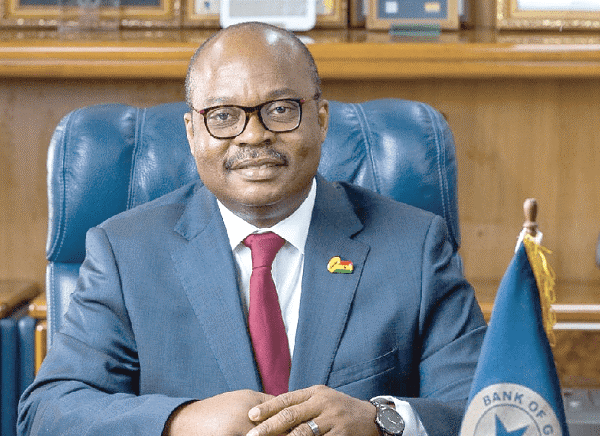Banks record GH¢4.3 billion profit-after-tax for the first half of 2023.
This is 51.4% increase over the GH¢2.8 billion recorded in 2022.
Collectively, the 2022 audited accounts show that the banks record direct losses of about GH¢14.81 billion and indirect losses amounted to GH¢1.22 billion induced by Domestic Debt Exchange Programme (DDEP) which started in the last quarter of 2022.
However, a summary of economic activities released by the Bank of Ghana (BoG) showed strong profitability performance during the first half of this year.
This translated into a higher return-on-equity of 37.6% from 21.9% in June 2022 and a higher return-on-assets of 5.5% compared to 4.6% in June 2022.
According to the data, net interest income increased by 41.4% to GH¢9.9 billion, relative to the increase of 12.4% recorded a year ago.
Similarly, net fees and commissions also grew by 30.6% to GH¢2.2 billion, compared with 27% over the same period last year.
As a result, operating income rose sharply by 46.1%, higher than the 22.6% recorded in 2022.
Banks record increased cost of operations
But, the cost of operations increased, with operating expenses increasing by 44.9% during the first half, compared with 22.9% growth for the same period in 2022.
The net effect of these developments was a 51.2% increase in profit-before-tax in June 2023, compared with 20.8% growth in June 2022.
Average lending rate fell to 31.5% in June 2023, from a high of 35.8% in January 2023.
This is equivalent to an average of 2.625% per month on loans charged by the banks.
Average lending rates
According to the data from BoG, the average lending rates began easing in April 2023, as it dropped to 31.6%.
This is surprising because inflation remains high at 42.3%.
In January 2023, average lending rates stood at 35.85%.
It went up to 36.64% in February 2023, but fell to 35.87% in March 2023.
It fell further sharply to 31.66% in April 2023 and 30.94% in May 2023, but rose slightly to 31.5% in June 2023.
The dip in lending rates may be due to the fact that the banks are diversifying their assets, following the impact of the DDEP, with a focus on lending which is their core business.
Average lending rates vary among banks
The average lending rates, however, vary among the banks and the respective sectors they lend to.
Some banks offer loans equivalent to the Ghana Reference Rate of 26.89% as of June 2923, whilst others will charge rates as high as 38%.
This however depends on the risk profile of the customers.
Some banks also perceive lending to the agriculture and construction sectors as riskier, and therefore credit to these sectors are expensive.
Key financial soundness indicators broadly stable
The key financial soundness indicators remained broadly sound, supported by the temporary regulatory reliefs extended to the banks in the wake of the DDEP.
The industry’s Capital Adequacy Ratio (CAR) for June 2023, stood at 14.3%, higher than the revised prudential minimum of 10%, but lower than the CAR of 19.4% recorded in June 2022.
The decline in the CAR is explained by the losses on mark-to-market investments from DDEP as well as the increase in the risk-weighted assets of banks.
The banks record of Non-Performing Loans (NPL) ratio deteriorated to 18.7% in June 2023 from 14.1% in June 2022, reflecting higher loan impairments and elevated credit risks.
The industry’s liquidity indicators, on the other hand, improved during the period under review.
Investments grow by 149.6%
Investments made by Ghana’s banking industry within a year increased sharply with short-term investments growing by 149.6 % to GH¢39.9 billion in June 2023, from GH¢15.9 billion in June 2022.
Total investments by banks rose to GH¢89.9 billion in June 2023 from GH¢1 billion in June 2022.
Governor of BoG Dr Ernest Addison who made the disclosures to journalists in Accra added that the growth in bank investments was supported by significant growth in deposits.
He disclosed however that medium-to-long term investments declined to GH¢50.1 billion from GH¢65 billion, as a result of portfolio rebalancing following DDEP.
Gold purchase programme rakes in $1 billion in 6 months
The BoG Governor further revealed that from the beginning of the year to June 2023, the Bank had built up $1 billion in reserves, mainly coming from its gold purchase programme, and settlement of short-term liabilities.
“Since inception of the programme, a total of 7.73 tonnes of monetary gold, valued at approximately $480 million, has been added to reserves under the Gold for Reserves programme, well ahead of the target of doubling the gold holdings in five years,” he stated.
Gross International Reserves (excluding encumbered assets and petroleum funds) improved to $2,353.95 million equivalent to 1.1 months of import cover, compared with $1,440.0 million (0.6 months of import cover) recorded at the end of December 2022.
Cedi relatively stable
The foreign exchange market has remained relatively stable for the first six months of 2023, supported by positive market sentiments derived from the IMF disbursement of the ECF first tranche of $600 million, forex purchases from the mining and oil sectors, and weakened demand.
The Ghana cedi depreciated by 20.6 percent against the US dollar in January 2023 and has remained generally stable since then with a cumulative depreciation of 1.8% between February and June 2023
BoG Policy Rate now 30%
The benchmark interest rate, (Policy rate) of the Bank of Ghana has been hiked up to 30% from the initial 29.5%.
The increment, BoG maintains is targeted at stemming the rising inflation.
Dr. Addison said Ghana’s macroeconomic framework required decisive tightening from both the fiscal and monetary side to anchor inflation expectations firmly on a declining path.
This is because the risks to the inflation profile are judged to be elevated driven by second round effects of food prices.
Inflation has persistently hovered around 42% throughout the second quarter of 2023 even though the central bank financing has been eliminated in the first six months of the year.
“Underlying measures of inflation have all ticked up in May 2023. While core inflation ticked up, businesses expectations of inflation remain flat at an elevated level.
“Although inflation is expected to decline in the near-term, baseline forecasts show a slightly higher elevated profile in the year ahead, which, if not contained, could embed in underlying inflationary pressures”, he explained.
This, Dr. Addison said is important that policy responds appropriately and decisively to prevent these risks from becoming embedded and consequently derail the disinflation process.



